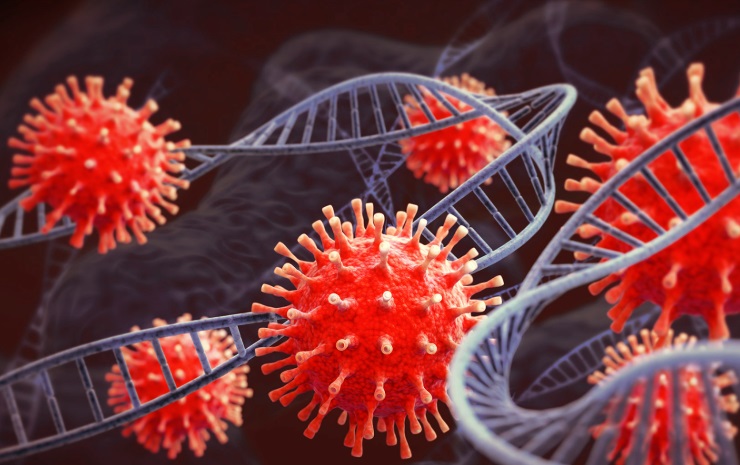Study Reveals That New Spike Mutations Let SARS-CoV-2 Infect Without ACE2 Receptor
Nikhil Prasad Fact checked by:Thailand Medical News Team Aug 03, 2025 6 months, 2 weeks, 6 days, 18 hours, 31 minutes ago
Medical News: Researchers Discover a New Pathway for COVID-19 Virus Entry
A new study by scientists from the Copenhagen Hepatitis C Program at Copenhagen University Hospital, Hvidovre, and the University of Copenhagen in Denmark has revealed that certain mutations in the spike protein of SARS-CoV-2 may allow the virus to infect human cells without using its usual entry point—the ACE2 receptor. This groundbreaking finding could have major implications for how we understand the virus's spread and evolution.
 Study Reveals That New Spike Mutations Let SARS-CoV-2 Infect Without ACE2 Receptor
Study Reveals That New Spike Mutations Let SARS-CoV-2 Infect Without ACE2 Receptor
Normally, the SARS-CoV-2 virus uses the ACE2 receptor, found on the surface of many human cells, to gain entry and start an infection. However, the team discovered that when the virus has specific mutations—E484D, P812R, and Q954H—it can bypass this receptor and still infect cells. This
Medical News report focuses on how this may explain the virus’s ability to infect different organs and evade current treatments or vaccines in some cases.
How the Study Was Done
Using lab-created virus particles, researchers tested how different combinations of these spike mutations affected the virus’s ability to infect several types of cells, including human liver and lung cells. The most revealing results came from three specific cell types: Vero E6 (monkey kidney cells), Huh7.5 (human liver cells), and A549 (human lung cells).
In monkey kidney cells, the P812R mutation allowed the virus to infect without ACE2. In liver cells, the E484D mutation had a similar effect. Interestingly, in lung cells, all three mutations—E484D, P812R, and Q954H—had to be present for the virus to infect cells without using the ACE2 receptor.
The team also tested whether a small deletion in the spike protein, known as Δ68–76, would help increase infectivity, but it did not. Even more importantly, they discovered that these mutant versions of the virus could still be neutralized by antibodies from people who had recovered from COVID-19, suggesting that the changes don’t make the virus invisible to the immune system.
Why This Matters
The ability of the virus to infect cells without relying on ACE2 could help explain how it manages to spread in tissues where ACE2 is not highly expressed, such as in certain parts of the lungs, liver, or brain. This adds a new layer of complexity in the fight against COVID-19, as it suggests the virus has alternative tricks up its sleeve to survive and spread.
According to the study, even when scientists blocked ACE2 receptors or used drugs to inhibit known viral entry pathways, these mutated versions of the virus still managed to infect cells. This makes clear that SARS-CoV-2 is capable of adapting to new environments within the body by tweaking just a few components of its spike protein.
These findings sho
w that E484D and P812R are especially important in helping the virus infect without ACE2 or enzymes like TMPRSS2, while Q954H may help in supporting the fusion of the virus with the cell membrane. The study also emphasizes that even though the virus is mutating, it remains vulnerable to antibodies generated during infection.
The ability of SARS-CoV-2 to evolve and use different pathways to infect human cells is a troubling sign that it may continue to adapt in ways we don't yet fully understand. Continued monitoring of spike protein changes will be critical for staying ahead of future variants and designing better vaccines and antiviral drugs.
The study findings were published in the peer reviewed journal PLOS One
https://journals.plos.org/plosone/article?id=10.1371/journal.pone.0326419
For the latest COVID-19 news, keep on logging to Thailand
Medical News.
Read Also:
https://www.thailandmedical.news/news/omicron-spike-mutation-q954h-makes-virus-fusion-more-powerful
https://www.thailandmedical.news/news/newer-sars-cov-2-variants-use-t191-mutation-to-evade-autophagy-and-strengthen-viral-survival
https://www.thailandmedical.news/news/nucleocapsid-r204p-mutation-in-sars-cov-2-omicron-xec-lineages-and-recombinants-enhances-inflammation-and-severity
